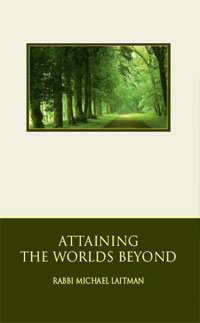What’s More Important: The Creator, or His Gifts?
In the course of our lives, we are forced to alter the external clothing of pleasure because of our increasing age or because of our community. There is no word in our vocabulary to define pleasure. Instead, there are words describing the form, the garb, and the objects from which we receive pleasure: from food, from nature, from a toy. We describe our striving for pleasure according to its type, as in “I like fish.”
The preferred pleasure of those who study Kabbalah can be determined by the question: is it Kabbalah that is important to the person, or is it the One who Gives the Kabbalah? Is Kabbalah important because it emanates from the Creator? Is it the Creator who is important, or is the observance of the spiritual laws and the reward ensuing from that observance, the most important thing?
The Difficult or Easy Path to the Creator
The complexity of the entire problem is in the fact that there is a short and easy path to the attainment of the spiritual condition, but our egoism does not allow us to take that path. As a rule, we tend to choose the difficult and tortuous path dictated to us by our egoism; we return to the initial point after much suffering, and only then do we follow the correct path.
The short and easy path is the path of faith, while the long and difficult one is the path of suffering. But just as it is difficult to choose the path of faith, so is it easy to follow it once it has been chosen.
An obstacle in the guise of a demand from our own lower intellect first to comprehend and only then to proceed, is called a “stumbling block” or a “stone” (even). Everyone stumbles on that stone.
Kabbalah Is all About the Soul’s Journey
Kabbalah talks only of one soul, the soul of any one of us, and about that soul’s ascent to the final stage. It is said in the Bible that when the arms (faith) of Moses (Moshe, deriving from the verb limshoch—to pull, to take oneself out of egoism) became weak, he began to lose the battle with the enemies (those he thought were his enemies were his own egotistical thoughts and desires).
Then the elders (his wise thoughts) sat him down (lowered his own intellect) on a stone (above egoism) and raised his arms (faith) and put a stone beneath them (lifted faith above the demands of the egoistic common sense), so that Israel would triumph (the aspiration to the spiritual ascent).
It is also said that the forefathers were idol-worshippers (the initial aspirations of a person are egoistic and are aimed to the benefit one’s own body) and that they were escapees (Zion derives from the word Yetzia, which tells us that through Yetziot—escape from egoism—the Light is received).
The Concealment of the Creator and His Revelation
In the world of a beginning Kabbalist, there are only two states: that of suffering or that of perceiving the Creator.
However, until an individual corrects one’s egoism, and can turn all personal thoughts and desires toward the benefit of the Creator, the world around him will be perceived only as a source of suffering.
But then, having sensed the Creator, one sees that the Creator fills the world with Himself, as the entire world consists of corrected spiritual objects. This picture of the world appears only if one gains spiritual sight. At that point, all former suffering begins to appear as necessary and pleasant because one has received a correction in the past.
Most important, an individual must know who is the Master in the world, and must realize that everything in the world transpires only in accordance with His wishes, despite the fact that the body, with the Will of the Creator, continuously professes that everything in this world happens by chance.
Forming a Bond with the Creator
Yet, in spite of the body, an individual must firmly believe that all actions in this world are followed by either a punishment or a reward. For example, if one suddenly feels a desire to elevate spiritually, it may seem to be by chance. After asking the Creator for help to act properly, no immediate answer is received and because of this, not enough importance is allotted to past prayer, which was forgotten. But the desire is the reward for former good deeds—the act of asking the Creator for help to act properly.
Or, if one declares that at the present stage, when one feels spiritually elevated, there are no other cares in life except the lofty ones, one must understand that (1) this state is sent by the Creator as an answer to earlier prayers, and (2) that by such an assertion, one proclaims the self capable of working independently.
This means the individual’s spiritual ascent depends on personal actions, rather than on those of the Creator. Moreover, if during one’s studies, one suddenly begins to perceive the object of learning, once again it must be reinforced that this is not accidental, but that the Creator sends one such a state.
Thus, while studying, we should place ourselves in a position of dependence on the Will of the Creator, so that we can strengthen our faith in the Upper Providence. Becoming dependent on the Creator, we thus form a bond with Him, which eventually lead to complete attachment to the Creator.
 “The Practical Guide to Forming a Bond with the Creator” is based on the book, Attaining the Worlds Beyond by Dr. Michael Laitman.
“The Practical Guide to Forming a Bond with the Creator” is based on the book, Attaining the Worlds Beyond by Dr. Michael Laitman.


I AM VERY GRATEFUL FOR THIS POST. THANK YOU SIR.